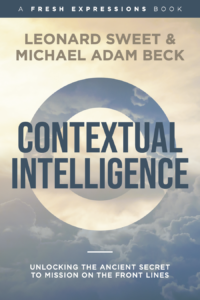This post begins a mini-series of three reflections on why contextual intelligence is important at every level of church life.
Each of these stories has one thing in common: a failure of contextual intelligence. I believe that if these leaders knew Issachar’s secret—the ancient secret to frontline mission—a totally different future may have been possible. Len Sweet and I wrote Contextual Intelligence: Unlocking the Ancient Secret to Mission on the Front Lines so faithful Jesus followers can avoid mistakes like this and grow in CQ: contextual intelligence. Consider how a little CQ can go a long way towards missional faithfulness and fruitfulness!
I believe that if these leaders knew Issachar’s secret—the ancient secret to frontline mission—a totally different future may have been possible.
Tweet this.
Story 1 – Cynthia
Cynthia is an ordained clergyperson in a mainline denomination. As an itinerant preacher, she has been successful at a series of revitalization appointments. Each church she has served has grown, and the episcopacy has noticed her gifts in leading congregations from decline into revitalization. She is deployed to a new appointment, full of hope that this will be another church that flourishes under her guidance.
Only it doesn’t. She is a gifted preacher who spends many hours each week preparing sermons. She spends a good deal of time in the office, making herself accessible to the congregation. She visits the sick in the hospital and the matriarchs of the congregation in their homes. She does all the things she did in previous appointments where churches began to thrive. None of it works. The congregation continues to decline and is now in a conversation about closure.
Cynthia fell victim to a false assumption: what works in one context will work in all contexts. She played to her strengths, hitting the ground running with what worked in previous congregations. She didn’t consider the aging nature of the congregation or the mass migration of folks from the neighborhood. Just before she arrived, the railroad, the major industry of this town, relocated further north. Now all families associated with the railroad have left town or are in an economic dilemma.
Cynthia fell victim to a false assumption: what works in one context will work in all contexts.
Tweet this.
Cynthia has a naturally high EQ (emotional intelligence). She knows how to love and lead people into health. But she did not consider the post-Christendom implications of her time, which has moved from Leave It to Beaver to Beavis and Butt-Head and The Simpsons to Family Guy and Modern Family. Whereas less than a lifetime ago, church and culture washed each other’s hands, the culture has now washed its hands of the church and makes sure the church’s dirty linens are aired in public. At best, going to church has all the appeal of a rainy weekend. At worst, church can feel like a scary place filled with horrifying people.
Whereas less than a lifetime ago, church and culture washed each other’s hands, the culture has now washed its hands of the church and makes sure the church’s dirty linens are aired in public.
Tweet this.
One of Cynthia’s practices at previous revitalizations is what she termed “winning the LOLs” (an acronym for little old ladies). By visiting the matriarchs of congregations in their homes, she was doing what we term in the field of contextual intelligence “joining through the hierarchy.” If church leaders want to have kingdom impact, we need to join and enlist the support of those at the top of the hierarchy, and in Cynthia’s case, these were indeed the LOLs.
What she did not consider was that in previous congregations, she followed clergy who were simply neglectful of the needs of the congregants. When she came along, showing genuine care for the spiritual matriarchs, many people who had left the congregations returned. She was entering into what we will describe in the book as a kind learning environment, in which consistent outcomes are linked directly to the appropriate actions.
In her new appointment, this was not the case. The aging nature of the congregation and the mass migration of folks from the neighborhood due to the railroad’s relocation created a wicked learning environment, in which the link between outcome and actions is misleading. No amount of targeted care for the inherited congregation could have produced revitalization. The previous membership had moved away, leaving only families with no previous connection to the church who were experiencing an economic dilemma. Cynthia was operating in what we call a closed system, in which a system’s operations do not depend on the context.
In the book, we describe 3D thinking, which is “doing time” by utilizing hindsight, insight, and foresight. Let us employ hindsight in Cynthia’s situation and imagine she made one small CQ adaptation. In addition to all her usual strategies, she informed the congregation that she would move her normal Monday office hours to the local diner from nine in the morning until noon. By immersing herself in the context, she connected with some of the servers. These were the “persons of peace” (Luke 10:6) in this community. They knew everybody in the town (and everybody’s business) through their work. They gave relational access to networks of individuals outside the life of the church. Furthermore, as Cynthia formed relationships with the servers, she learned about their struggles. She became a pastor to them. They began to attend worship on Sunday mornings, and they brought friends—lots of them! Over time, revitalization occurred in a contextually appropriate way. Cynthia, triggered revitalization by immersing herself in the context and getting to know the natives, not simply serving the existing congregation as a personal spiritual butler.
In my next story, I want to tell you about John, a nondenominational pastor in an autonomous congregational church system. Stay tuned!
Check out Contextual Intelligence: Unlocking the Ancient Secret to Mission on the Front Lines by Len Sweet and Michael Beck!



